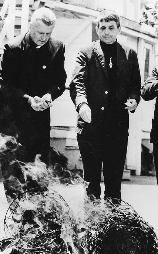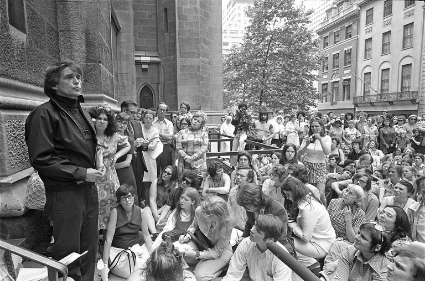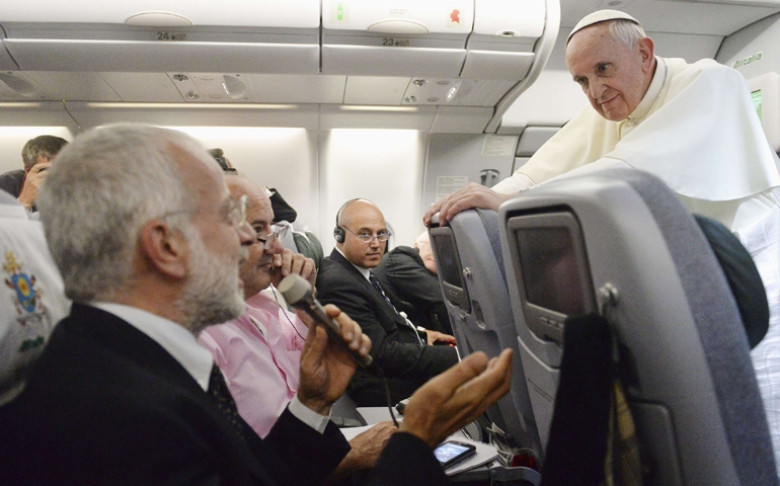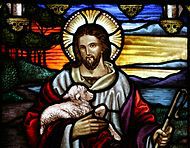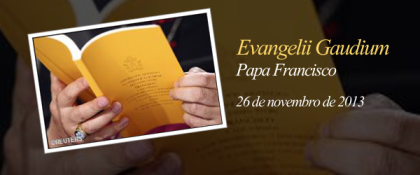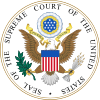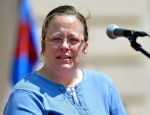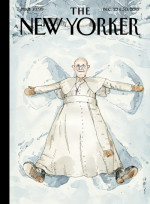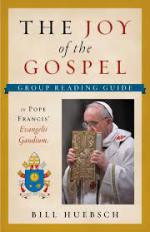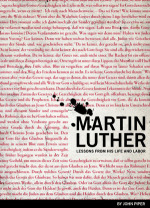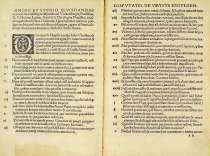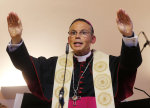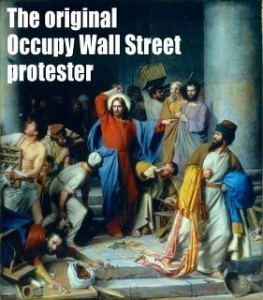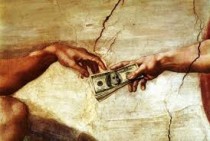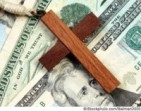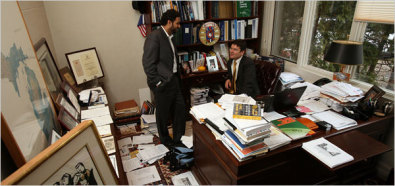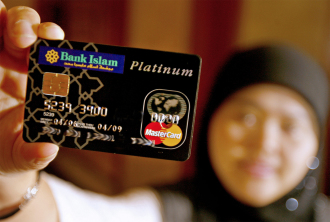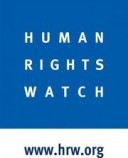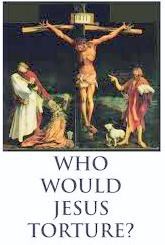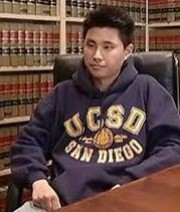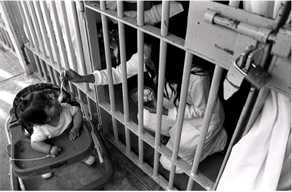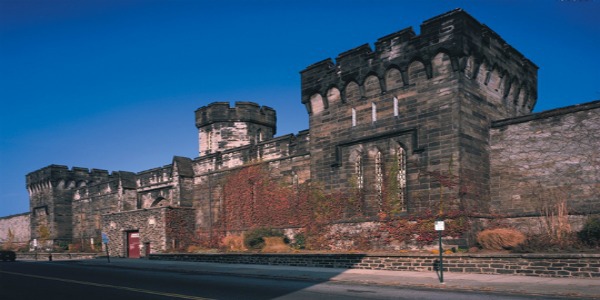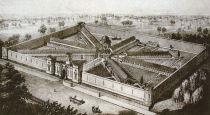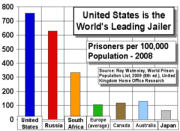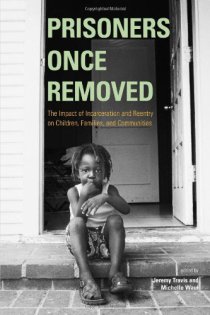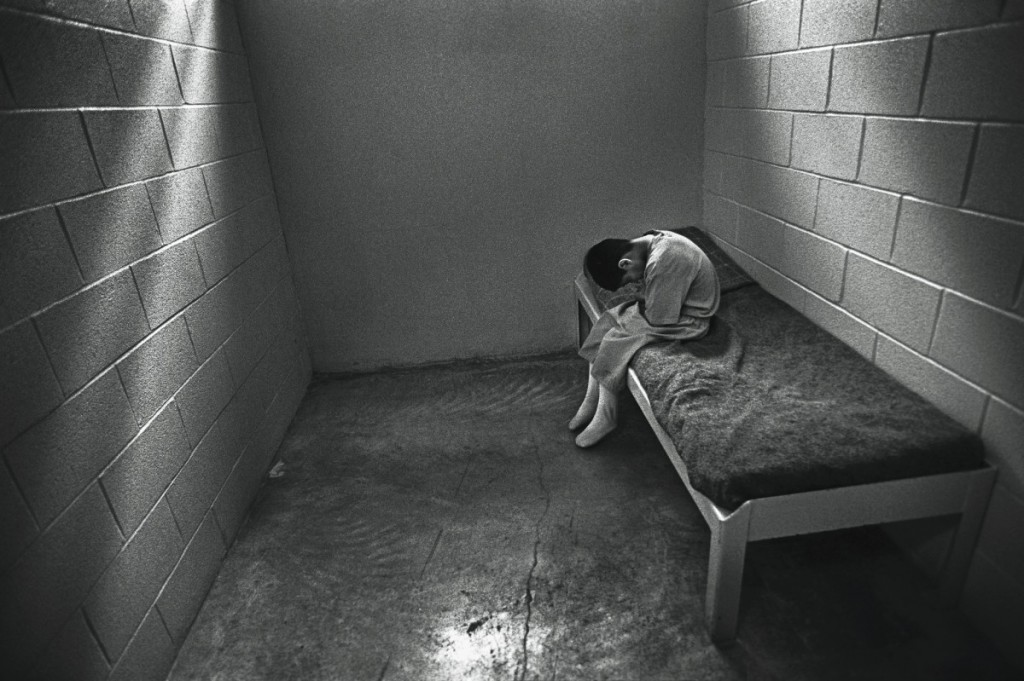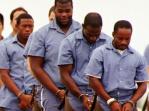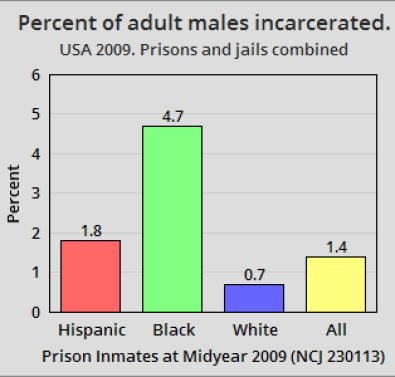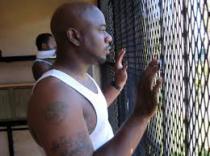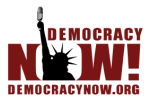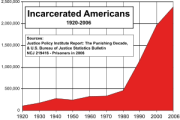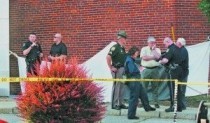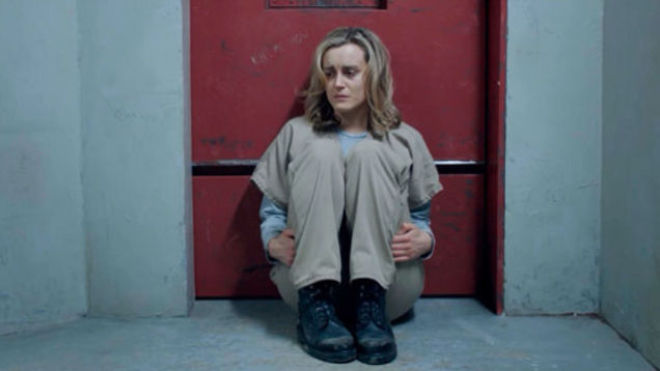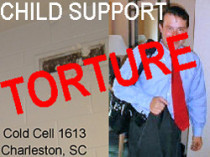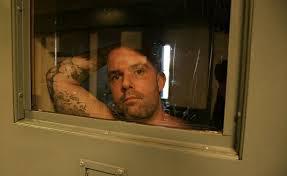WWJD? What Would Jesus REALLY Do?
Earthly Jesus was born Jewish, and a teacher,
a fisherman, and a carpenter by trade.
"One of the Great Revolutionaries": Daniel Berrigan Remembered as Hundreds Gather for
Funeral
Democracy Now
by Amy Goodman
May 9, 2016
Left: Father Berrigan, right and his brother Philip Berrigan seized hundreds of draft records and set them on fire with homemade napalm in 1968
More than 800 people packed into the Church of St. Francis Xavier in New York Friday for the funeral of Daniel Berrigan, the legendary antiwar priest, poet and activist. He died on April 30 at the age of 94. Today would have been his 95th birthday. Dan and his brother, the late Phil Berrigan, made international headlines in 1968 when they and seven other Catholic antiwar activists burned draft cards in Catonsville, Maryland, to protest the Vietnam War. Prior to the funeral, hundreds took part in a two-hour procession beginning at Mary House, a Catholic Worker house in the East Village. Democracy Now!’s Mike Burke was there and spoke to participants including singer Dar Williams, the Rev. John Dear, Dan’s niece Frida Berrigan, Kathy Kelly and John Schuchardt, who was arrested with Dan in 1980 when they broke into the GE nuclear missile plant in King of Prussia, Pennsylvania, launching the Plowshares Movement.
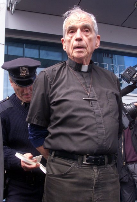 Father Berrigan being handcuffed in 2001 after he and others blocked an entrance to the Intrepid Sea, Air and Space Museum in Manhattan
Father Berrigan being handcuffed in 2001 after he and others blocked an entrance to the Intrepid Sea, Air and Space Museum in Manhattan
Daniel J. Berrigan, Defiant Priest Who Preached
Pacifism, Dies at 94
The New York Times
By DANIEL LEWIS
April 30, 2016
The Rev. Daniel J. Berrigan, a Jesuit priest and poet whose defiant protests helped shape the tactics of opposition to the Vietnam War and landed him in prison, died on Saturday in the Bronx. He was 94.
His death, at Murray-Weigel Hall, the Jesuit infirmary at Fordham University, was confirmed by the Rev. James Martin, editor at large at America magazine, a national Catholic magazine published by the Jesuits.
The United States was tearing itself apart over civil rights and the war in Southeast Asia when Father Berrigan emerged in the 1960s as an intellectual star of the Roman Catholic "new left," articulating a view that racism and poverty, militarism and capitalist greed were interconnected pieces of the same big problem: an unjust society.
It was an essentially religious position, based on a stringent reading of the Scriptures that some called pure and others radical. But it would have explosive political consequences as Father Berrigan; his brother Philip, a Josephite priest; and their allies took their case to the streets with rising disregard for the law or their personal fortunes.
A defining point was the burning of Selective Service draft records in Catonsville, Md., and the subsequent trial of the so-called Catonsville Nine, a sequence of events that inspired an escalation of protests across the country; there were marches, sit-ins, the public burning of draft cards and other acts of civil disobedience.
__________________________________________________
....Pope Francis On Gays: Who Am I To Judge Them?....
Pope on homosexuals: 'Who am I to judge?'
National Catholic Reporter
By John L. Allen Jr.
Jul. 29, 2013
Aboard the papal plane -- One way to tell that a pope is feeling good at the end of a long trip is when he comes back to the press compartment and does precisely what he said at the beginning of the journey he won't, or can't, do.
On the way to Rio de Janeiro on July 22, Pope Francis told reporters, "I don't give interviews." But at the end of his seven-day tour de force in Brazil, not only did the pope give an interview, he gave a whopper of one....
last paragraph...
"When I meet a gay person, I have to distinguish between their being gay and being part of a lobby. If they accept the Lord and have goodwill, who am I to judge them? They shouldn't be marginalized. The tendency [to homosexuality] is not the problem ... they're our brothers." -- Pope Francis
National Catholic Reporter
Pope on homosexuals - Who am I to Judge.[...]
Adobe Acrobat document [52.2 KB]
Catholicism
Wikipedia
"Catholic" redirects here. For Christians who recognize the authority of the pope, see Catholic Church. For the whole body of Christians, see Christian Church. For other uses, see Catholic (disambiguation).
Catholicism (from Greek, katholikismos, "universal doctrine") is the branch of Christianity composed of churches that describe themselves as Catholic, which share certain traditions in theology, doctrine, liturgy, ethics, and spirituality. Notably, these traits often include the episcopal polity, sacramental theology and apostolic succession.
"Catholicism" and "Catholic" in this sense refer to various Christian churches, as well as their beliefs and practices. This sense is to be distinguished from the use of these words to refer to the Roman Catholic Church, that which is in full communion with the Holy See of Rome,[1] as well as the Eastern Orthodox Church (commonly called the "Orthodox Church"), and churches of the Anglican Communion which all consider themselves within the universal and apostolic church.
In the sense of indicating historical continuity of faith and practice from the first millennium, the term "catholic" is employed by many other historic churches, such as the Anglican Communion,[2] Lutheran Church,[3] Methodist Church,[2] Moravian Church,[4] and Reformed Church,[5] all of which claim to be "heirs of the apostolic faith",[6] as delineated in the Nicene Creed.[7] These Christian denominations consider themselves to be catholic, teaching that the term "designates the historic, orthodox mainstream of Christianity whose doctrine was defined by the ecumenical councils and creeds" and as such, most Reformers "appealed to this catholic tradition and believed they were in continuity with it."[3]
Within the Anglican Communion, the Oxford Movement promoted Anglo-Catholicism, which reemphasized the importance of doctrines such as the Real presence of Christ in the Eucharist and apostolic succession.[8][9] Read more
Evangelii Gaudium by Pope Francis is an important advocacy, inter alia, for poor people and working families of the world by a major religion. "Pope Francis attacked unfettered capitalism as "a new tyranny" and beseeched global leaders to fight poverty and growing inequality...setting out a platform for his papacy and calling for a renewal of the Catholic Church." (Reuters)
- What would Jesus do? Wikipedia
Burwell v. Hobby Lobby, 573 U.S. __ (2014), is a landmark decision[1][2] by the United States Supreme Court allowing closely held for-profit corporations to be exempt from a law its owners religiously object to if there is a less restrictive means of furthering the law's interest. It is the first time that the court has recognized a for-profit corporation's claim of religious belief,[3] but it is limited to closely held corporations.[a] The decision is an interpretation of the Religious Freedom Restoration Act (RFRA) and does not address whether such corporations are protected by the free-exercise of religion clause of the First Amendment of the Constitution. (Wikipedia)
by Kim Bhasin, Huffington Post
Also see Separation of church and state in the United States.
The Establishment Clause is the first of several pronouncements in the First Amendment to the United States Constitution, stating,
Congress shall make no law respecting an establishment of religion, or prohibiting the free exercise thereof...
Evangelii Gaudium, Wikipedia
Evangelii Gaudium (English: The Joy of the Gospel) is a 2013 apostolic exhortation by Pope Francis on "the church's primary mission of evangelization in the modern
world."[1] It has been described as a "remarkable and radical document, one that ranges widely and challenges complacency at every level,"[1] as well as "the manifesto of Francis"[2] and a "Magna
Carta for church reform." Read more
His Holiness, Pope Francis PP.
00120 Via del Pellegrino
Citta del Vaticano
Evangelii Gaudium - The Joy of the Gospel (English translation)
Evangelii Gaudium - 232.pdf
Adobe Acrobat document [7.0 MB]
Obergefell v. Hodges
Wikipedia
Obergefell v. Hodges, 576 U.S. ___ (2015), is a landmark United States Supreme Court case in which the Court held in a 5–4 decision that the fundamental right to marry is guaranteed to same-sex couples by both the Due Process Clause and the Equal Protection Clause of the Fourteenth Amendment to the United States Constitution.[2][3]
In November 2014, following a lengthy series of appeals court rulings from the Fourth, Seventh, Ninth, and Tenth Circuits that state-level bans on same-sex marriage were unconstitutional, the Sixth Circuit ruled that it was bound by Baker v. Nelson and found them constitutional, creating a split between circuits and leading to an almost inevitable Supreme Court review.
Decided on June 26, 2015, Obergefell overturned Baker and requires all states to issue marriage licenses to same-sex couples and to recognize same-sex marriages validly performed in other jurisdictions.[4] This legalized same-sex marriage throughout the United States, and its possessions and territories. The Court examined the nature of fundamental rights guaranteed to all by the Constitution, the harm done to individuals by delaying the implementation of such rights while the democratic process plays out, and the evolving understanding of discrimination and inequality that has developed greatly since Baker.
Prior to Obergefell, thirty-six states, the District of Columbia, and Guam already issued marriage licenses to same-sex couples.[3] The governor of Puerto Rico announced on June 26 that same-sex marriage would begin in that territory within 15 days, and on June 29 and June 30, the governors of the Northern Mariana Islands and the Virgin Islands (respectively) made similar announcements. The status of same-sex marriage in American Samoa remains uncertain. Read more
Obergefell v. Hodges, SCOTUS 14-556_3204[...]
Adobe Acrobat document [429.2 KB]
Kim Davis (county clerk)
Wikipedia
Kimberly Jean Bailey Davis [5] (born September 17, 1965) is the county clerk of Rowan County, Kentucky. In 2015, Davis gained national media attention after defying a federal court order requiring that she issue marriage licenses following the U.S. Supreme Court decision in Obergefell v. Hodges, which held that there is a right to same-sex marriage guaranteed by the Fourteenth Amendment.[6][7][8][9]. Read more
_____________________________________________________
The section on Kim Davis, Rowan County Clerk, has been moved, and is now on the Traditional Marriage sub-page, with a link found on the left side of this page near the top.
_____________________________________________________
Pope Francis Met With Kim Davis, Kentucky County Clerk, in Washington
The New York Times
By JIM YARDLEY and
LAURIE GOODSTEIN
SEPT. 30, 2015
ROME — Pope Francis met privately in Washington last week with Kim Davis, the county clerk in Kentucky who defied a court order to issue marriage licenses to same-sex couples, adding a new element to an American tour that saw Francis attract huge crowds and articulate left-leaning positions on poverty, immigration, the environment and inequality.
Vatican officials initially would not confirm that the meeting occurred, finally doing so on Wednesday afternoon, while refusing to discuss any details.
Ms. Davis, the clerk in Rowan County, Ky., has been at the center of a nationwide controversy over whether government employees and private businesses have a legal right to refuse to serve same-sex couples. She spent five days in jail for disobeying a federal court order to issue the licenses.
On Tuesday night, her lawyer, Mathew D. Staver, said that Ms. Davis and her husband, Joe, were sneaked into the Vatican Embassy by car on Thursday afternoon. Francis gave her rosaries and told her to "stay strong," the lawyer said. The couple met for about 15 minutes with the pope, who was accompanied by security guards, aides and photographers.
"I put my hand out and he reached and he grabbed it, and I hugged him and he hugged me," Ms. Davis said Wednesday in an interview with ABC News. ‘Thank you for your courage.’"
"I had tears coming out of my eyes," she said. "I’m just a nobody, so it was really humbling to think he would want to meet or know me."
The secretiveness of the meeting, and the Vatican’s refusal to give any information, will inevitably raise questions about why Francis chose to meet with Ms. Davis — and why he kept the meeting secret. Mr. Staver said that he, the Davises and Vatican officials had agreed to not publicize the meeting until after the pope had left the United States because, he said, "we didn’t want the pope’s visit to be focused on Kim Davis."
Mr. Staver said the idea for a meeting was first discussed on Sept. 14, more than a week before the pope’s arrival. He declined to say who proposed the meeting. Read more
___________________________________________________________________
Who Am I To Judge?
A radical Pope’s first year
The New Yorker
By James Carroll
December 23, 2013 Issue
Paragraph 7 --
Who am I to judge?" With those five words, spoken in late July in reply to a reporter’s question about the status of gay priests in the Church, Pope Francis stepped away from the disapproving tone, the explicit moralizing typical of Popes and bishops. This gesture of openness, which startled the Catholic world, would prove not to be an isolated event. In a series of interviews and speeches in the first few months after his election, in March, the Pope unilaterally declared a kind of truce in the culture wars that have divided the Vatican and much of the world. Repeatedly, he argued that the Church’s purpose was more to proclaim God’s merciful love for all people than to condemn sinners for having fallen short of strictures, especially those having to do with gender and sexual orientation. His break from his immediate predecessors—John Paul II, who died in 2005, and Benedict XVI, the traditionalist German theologian who stepped down from the papacy in February—is less ideological than intuitive, an inclusive vision of the Church centered on an identification with the poor. From this vision, theological and organizational innovations flow. The move from rule by non-negotiable imperatives to leadership by invitation and welcome is as fundamental to the meaning of the faith as any dogma. Read more
Who Am I To Judge - The New Yorker.pdf
Adobe Acrobat document [302.6 KB]
Religion News Service aims to be the largest single source of news about religion, spirituality and ideas...
RNS is a non-profit, limited liability corporation owned by the Religion Newswriters Foundation and based at the National Press Building in Washington, D.C., with a business office at the University of Missouri School of Journalism in Columbia, Mo. RNS’s mission is to provide in-depth, non-sectarian coverage of religion, spirituality and ideas. Read more Religion News Service, Wikipedia
___________________________________________________
Pope attacks 'tyranny' of markets in manifesto for papacy
Reuters
By Naomi O'Leary
November 26, 2013
(Reuters) - Pope Francis attacked unfettered capitalism as "a new tyranny" and beseeched global leaders to fight poverty and growing inequality, in a document on Tuesday
setting out a platform for his papacy and calling for a renewal of the Catholic Church.
The 84-page document, known as an apostolic exhortation, was the first major work he has authored alone as pope and makes official many views he has aired in sermons and
remarks since he became the first non-European pontiff in 1,300 years in March.
In it, Francis went further than previous comments criticizing the global economic system, attacking the "idolatry of money", and urged politicians to "attack the
structural causes of inequality" and strive to provide work, healthcare and education to all citizens.
He also called on rich people to share their wealth. "Just as the commandment 'Thou shalt not kill' sets a clear limit in order to safeguard the value of human life,
today we also have to say 'thou shalt not' to an economy of exclusion and inequality. Such an economy kills," Francis wrote in the document issued on Tuesday.
"How can it be that it is not a news item when an elderly homeless person dies of exposure, but it is news when the stock market loses 2 points?"
The pope said renewal of the Church could not be put off and said the Vatican and its entrenched hierarchy "also need to hear the call to pastoral
conversion".
"I prefer a Church which is bruised, hurting and dirty because it has been out on the streets, rather than a Church which is unhealthy from being confined and from
clinging to its own security," he wrote.
Italian theologian Massimo Faggioli greeted the work as "the manifesto of Francis" while veteran Vatican analyst John Thavis called it a "Magna Carta for church
reform". Read more
Pope attacks 'tyranny' of markets in man[...]
Adobe Acrobat document [59.1 KB]
_____________________________________________
An Earlier Reformation Began in 1517
Martin Luther and the Protestant Reformation
_____________________________________________
Martin Luther
Wikipedia
Martin Luther (November 10, 1483 – February 18, 1546) was a German friar, priest and professor of theology and a seminal figure in the Protestant Reformation.[2] Initially an Augustinian friar, Luther came to reject several teachings and practices of the Roman Catholic Church. He strongly disputed the claim that freedom from God's punishment for sin could be purchased with money. He confronted indulgence salesman Johann Tetzel, a Dominican friar, with his Ninety-Five Theses in 1517. His refusal to retract all of his writings at the demand of Pope Leo X in 1520 and the Holy Roman Emperor Charles V at the Diet of Worms in 1521 resulted in his excommunication by the Pope and condemnation as an outlaw by the Emperor.
Luther taught that salvation and subsequently eternal life is not earned by good deeds but is received only as a free gift of God's grace through faith in Jesus Christ as redeemer from sin. His theology challenged the authority and office of the Pope by teaching that the Bible is the only source of divinely revealed knowledge from God[3] and opposed sacerdotalism by considering all baptized Christians to be a holy priesthood.[4] Those who identify with these, and all of Luther's wider teachings, are called Lutherans even though Luther insisted on Christian as the only acceptable name for individuals who professed Christ. Today, Lutheranism constitutes a major branch of Protestant Christianity with some 80 million adherents, while Protestantism itself is represented by an estimated more than 800 million people worldwide.[5][6][7]
His translation of the Bible into the vernacular (instead of Latin) made it more accessible, which had a tremendous impact on the church and German culture. It fostered the development of a standard version of the German language, added several principles to the art of translation,[8] and influenced the writing of an English translation, the Tyndale Bible.[9] His hymns influenced the development of singing in churches.[10] His marriage to Katharina von Bora set a model for the practice of clerical marriage, allowing Protestant priests to marry.[11]
In his later works, notably On the Jews and Their Lies, Luther expressed antagonistic views toward Judaism, writing that Jewish synagogues and homes should be destroyed, their money confiscated, and liberty curtailed. These statements and their influence on antisemitism have contributed to his controversial status.[12] Martin Luther died in 1546, still convinced of the correctness of his Reformation theology. Read more
______________________________________________
Heresy
Wikipedia
Heresy is any provocative belief or theory that is strongly at variance with established beliefs or customs. A heretic is a proponent of such claims or beliefs.[1] Heresy is distinct from both apostasy, which is the explicit renunciation of one's religion, principles or cause,[2] and blasphemy, which is irreverence toward religion.[3]
The term is usually used to refer to violations of important religious teachings, but is used also of views strongly opposed to any generally accepted ideas.[4] It is used in particular in reference to Christianity, Judaism, Islam and Marxism.[5]
In certain historical Islamic, Christian, and Jewish cultures, among others, espousing ideas deemed heretical has been and in some cases still is subjected not merely to punishments such as excommunication, but even to the death penalty. Read more
OCCUPIED and Lessons Learn From The Worl[...]
Adobe Acrobat document [59.3 KB]
We are beggars. This is true.
Martin Luther
Lessons from His Life and Labor
desiringGod.org, by John
Piper
- We are beggars, this is true! Pastoral Meanderings
- Luther’s Legacy to Christianity GnesioLutheran.com
- We are beggars; this is true Patheos
Wikipedia
The Protestant Reformation, often referred to as the Reformation, was the schism within Western Christianity initiated by Martin Luther, John Calvin, Huldrych Zwingli and other early Protestant Reformers.[a] The core motivation behind these changes was theological, though many other factors played a part, including the rise of nationalism, the Western Schism which eroded people's faith in the Papacy, the perceived corruption of the Roman Curia, and the new learning of the Renaissance which questioned much traditional thought.
Although there had been significant earlier attempts to reform the Roman Catholic Church before Luther — such as those of Jan Hus, Peter Waldo, and John Wycliffe — it is Martin Luther who is widely acknowledged to have started the Reformation with his 1517 work The Ninety-Five Theses. Luther began by criticising the selling of indulgences, insisting that the Pope had no authority over purgatory and that the Catholic doctrine of the merits of the saints had no foundation in the gospel. Read more
___________________________________________________________________
Lutheranism
Wikipedia
Lutheranism is a major branch of Protestant Christianity that identifies with the theology of Martin Luther—a German friar, ecclesiastical reformer, and theologian.
Luther's efforts to reform the theology and practice of the Catholic Church launched the Protestant Reformation in the German-speaking territories of the Holy Roman Empire. Beginning with the Ninety-Five Theses, first published in 1517, Luther's writings were disseminated internationally, spreading the early ideas of the Reformation beyond the influence and control of the Roman Curia and the Holy Roman Emperor.[1] The split between the Lutherans and the Catholics was made public and clear with the 1521 Edict of Worms: The edicts of the Diet condemned Luther and officially banned citizens of the Holy Roman Empire from defending or propagating his ideas, subjecting advocates of Lutheranism to forfeiture of all property, half of the seized property to be forfeit to the imperial government and the remaining half forfeit to the party who brought the accusation.[2] The divide centered primarily on two points: the proper source of authority in the church, often called the formal principle of the Reformation, and the doctrine of justification, often called the material principle.[3]
Lutheranism advocates a doctrine of justification "by grace alone through faith alone on the basis of Scripture alone", the doctrine that scripture is the final authority on all matters of faith, denying the belief of the Catholic Church defined at the Council of Trent concerning authority coming from both the Scriptures and Tradition.[4] In addition, Lutheranism accepts the teachings of the first four ecumenical councils of the undivided Christian Church.[5][6]
Unlike the Reformed tradition, Lutherans retain many of the liturgical practices and sacramental teachings of the pre-Reformation Church, with a particular emphasis on the Eucharist, or Lord's Supper. Lutheran theology differs from Reformed theology in Christology, the purpose of God's Law, the divine grace, the concept of perseverance of the saints, and predestination.
Today, Lutheranism is one of the largest denominations of Protestantism. With approximately 80 million adherents,[7] it constitutes the third most common Protestant denomination after historically Pentecostal denominations and Anglicanism.[8] The Lutheran World Federation, the largest global communion of Lutheran churches, represents over 72 million people.[9] There are also many smaller bodies such as the International Lutheran Council and the Confessional Evangelical Lutheran Conference, as well as independent churches. Read more
__________________________________________________
The Value of Suffering, The New York Times
By PICO IYER, Sept. 7, 2013
Philosophy Forum, The Value of Suffering
Letter to the Editor, The Value of Suffering
What Suffering Does, The New York Times
By David Brooks, April 7, 2014
By PICO IYER, Sept. 7, 2013
The Value of Suffering.pdf
Adobe Acrobat document [173.7 KB]
'Bishop of Bling' was bound to irk austere Pope Francis
Suspended 'Bishop of
Bling' was bound to irk austere Pope Francis
Los Angeles Times
By Carol J. Williams
October 23, 2013
When Bishop Franz-Peter Tebartz-van Elst of Germany traveled to India last year to minister to poor slum dwellers, he reportedly flew first class.
This year, renovations of the Roman Catholic bishop's church-owned residence in the city of Limburg ran massively over budget to cover $620,000 worth of artwork, $1.1
million in landscaping and last-minute design revisions -- $42 million in all, billed to the Vatican and German taxpayers, Hamburg's tabloid daily Bild reported.
Dubbed the "Bishop of Bling" by European media that have been avidly tracking the bespectacled clergyman's lavish lifestyle, Tebartz-van Elst was suspended from his post
by Pope Francis on Wednesday in a clear sign that the new pontiff is serious about diverting resources from the "princes of the church" to the paupers in its congregations. Read more
Jesus and the Money Changers
"And Jesus went into the temple and began to cast out them that sold and bought in the temple, and overthrew the tables of the money changers" - Mark 11:15 Cleansing of the Temple, Wikipedia
Globalization at the Crossroads is a story of possibility. People are living longer, healthier, and better lives than ever before. Globalization has produced more prosperity in the past 60 years than in the previous two thousand. An eight-minute film featuring Hernando de Soto summarizing his ideas and the Institute of Liberty and Democracy's work. Read more
This Land is Your Land, World
Policy Institute
A Conversation with Hernando de Soto
Global Meltdown Rule No. 1: Do the
math
By Hernando de Soto, Los Angeles Times
________________________________________
Attitudes may be changing toward unfettered capitalism.
Pope Francis wrote in Evangelii Gaudium:
Paragraphs 53-54, pages 45-46 Evangelii Gaudium
53. Just as the commandment "Thou shalt not kill" sets a clear limit in order to safeguard the value of human life, today we also have to say "thou shalt not" to an
economy of exclusion and inequality. Such an economy kills. How can it be that it is not a news item when an elderly home-less person dies of exposure, but it is news when the stock market loses two
points? This is a case of exclusion. Can we continue to stand by when food is thrown away while people are starving? This is a case of inequality. Today everything comes under the laws of competition
and the survival of the fittest, where the powerful feed upon the powerless. As a consequence, masses of people find themselves excluded and marginalized: without work, without possibilities, without
any means of escape. Human beings are themselves considered consumer goods to be used and then discarded. We have created a "throw away" culture which is now spreading. It is no longer simply about
exploitation and oppression, but something new. Exclusion ultimately has to do with what it means to be a part of the society in which we live; those excluded are no longer society’s underside or its
fringes or its disenfranchised – they are no longer even a part of it. The excluded are not the "exploited" but the outcast, the "leftovers".
54. In this context, some people continue to defend trickle-down theories which assume that economic growth, encouraged by a free market, will inevitably succeed in
bringing about great-er justice and inclusiveness in the world. This opinion, which has never been confirmed by the facts, expresses a crude and naïve trust in the goodness of those wielding economic
power and in the sacralized workings of the prevailing economic system. Meanwhile, the excluded are still waiting. To sustain a lifestyle which excludes others, or to sustain enthusiasm for that
selfish ideal, a globalization of indifference has developed. Almost without being aware of it, we end up being incapable of feeling compassion at the outcry of the poor, weeping for other people’s
pain, and feeling a need to help them, as though all this were someone else’s responsibility and not our own. The culture of prosperity deadens us; we are thrilled if the market offers us some-thing
new to purchase. In the meantime all those lives stunted for lack of opportunity seem a mere spectacle; they fail to move us.
Paragraphs 53-54, pages 45-46
http://www.vatican.va/evangelii-gaudium/en/
A Plan for the Future
Neil J. Gillespie, opinion
1. Develop a trickle-up economy. This is not a new concept. Henry Ford believed in what may be called Trickle-Up Economics. Ford paid his workers
good wages, and in turn the workers created economic activity.
Daily Kos: "In 1914, Henry Ford paid his workers $5 a day, that was
double the average wage for manufacturing jobs at the time. He did this because he wanted his workers to buy his cars." Let's try that today, we'll call
it...Trickle up economics.
2. Medicare for All. The health of the American People is too important to hand off to private industry. The two largest exporting nations have
universal healthcare, Germany and China. U.S. companies are at a competitive disadvantage when they must pay extra-ordinary rents to a protected private healthcare industry.
H.R. 676: Expanded & Improved Medicare For All Act
113th Congress, 2013–2015. Text as of Feb 13, 2013 (Introduced).
A Bill: To provide for comprehensive health insurance coverage for all United States residents, improved health care delivery, and for other purposes. Read the Bill
Analysis of HR 676:
Medicare for All would save billions, Physicians for a National Health Program, by Gerald Friedman, Ph.D. "Of all the forms of inequality, injustice in health
care is the most shocking and inhumane." Martin Luther King, Jr.
Public Healthcare - U.S. Senator Bernie Sanders (I-VT)
U.S. Healthcare Held Hostage by Corporate Fraud
U.S. Senator Bernie Sanders (I-VT)
- Letter to Archbishop Thomas Wenski, Archdiocese of Miami, Member Sole Catholic Health Services et al.
Read more on the Justice Network healthcare page
3. Debt jubilee. As part of a national economic reorganization plan, canceled home mortgage debt, forgive student loans, and declare a debt jubilee for poor people, the working-class and middle-class.
4. Response to dictators and war criminals. Ratify the Rome Statute of the International Criminal Court (ICC). The ICC may be flawed, but it is a step in the right direction. ICC on YouTube
Refugees can be relocated, as proposed in the Slattery Report, a report in 1939–40 by the U.S. Department of the Interior, which included a plan to move European
refugees, especially Jews from Nazi Germany and Austria, to four locations in Alaska, including Baranof Island and the Mat-Su Valley. Read more
Read the response of President Obama to my proposal on Syria.
5. A plan to end terrorism. Offer our aggrieved brothers and sisters a legitimate way to exercise a right to petition the government for redress of
grievances, either their own government, or ours, and fulfill the promise of the Magna Carta.
The right to petition the government for redress of grievances is the right to make a complaint to, or seek the assistance of, one's government, without fear of punishment or reprisals. The Article 44 of the Charter of Fundamental Rights of the
European Union ensures the right to petition to the European Parliament. The right can be traced back to the Bill of Rights 1689, the Petition of Right (1628), and the Magna Carta (1215). Terrorists
have grievances. Give them a way to peacefully resolve those grievances.
6. Establish a right to legal aid, as proposed by Gabriela Knaul, the United Nations Special Rapporteur on the independence of judges and lawyers, Office of the United Nations High Commissioner for Human Rights (OHCHR). See "Legal aid, a right in itself" – UN Special Rapporteur. Also proposed by the American Bar Association, here as a Human Right and here with the ABA's Toolkit.
_________________________________________________________
I am not an expert or authority on the bible, but....
Exodus 22:25, "If you lend money to one of your poor neighbors among my people, you shall not act like an extortioner toward him by demanding interest from him." This prohibition is repeated 22 times in the Old Testament.
Brief History of Christianity and Capitalism
Christian Economics, by Most Rev. Dr. Robert M. Bowman, 2002
"...Deuteronomy 15:1-11 orders the cancellation of all debts at the end of every seventh year. And it cautions against refusing to lend to one in need because this time is near. So your loan will never be repaid to you. So what? The Lord will take care of you. But if you refuse one in need, the Lord will hold you "guilty of sin." "I command you to open your hand to your countrymen who are poor and needy." Deuteronomy 24: 19-21 establishes gleaners rights for "the alien, the fatherless, and the widow."
The New Testament also has some things to say about economics. Most of them should be profoundly troubling to the wealthy. James 5:1, for example, says, "Next a word to you who are rich. Weep and wail over the miserable fate overtaking you: your riches ... will be evidence against you and consume your flesh like fire. ... You have lived on the land in wanton luxury, gorging yourselves — and on the day appointed for your slaughter."
Jesus himself had much to say on the subject. Perhaps the most famous is Matthew 19: 21-24: "If you wish to be perfect, go, sell what you have and give to the poor, and you will have treasure in heaven. Then come, follow me. ... Amen, I say to you, it will be hard for one who is rich to enter the kingdom of heaven. Again I say to you, it is easier for a camel to pass through the eye of a needle than for one who is rich to enter the kingdom of God."... Read more
Brief History of Christianity and Capita[...]
Adobe Acrobat document [314.3 KB]
Andrew Schmidt of the Briefing writes...February 1, 2011…
We also must not forget that the ban on charging interest was never an isolated negative stipulation. Rather, the flipside of the ban is a positive duty to help (Lev
25:35-37). Thus, every instance of another person's need or desire presents me with a choice, either to help or to take advantage. If we have wealth that we do not need, God wants us to use it to
help others, like the Lord Jesus, who used his riches for our sakes (2 Cor 8:9). Read more
________________________________________________________
Mapping the Real Deal: Where Would Jesus Bank? by Catherine Austin
Fitts
July 4th, 2004
I think of Jesus as a real deal, straight up kind of guy who always cared deeply about his fellow man. That's why we often ask "What would Jesus do?" when looking for the
action of highest integrity.
Jesus and the Bankers
Jesus acted with ferocious and bold integrity when he threw the money changers out of the temple. Needless to say, he hiccuped their cash flows on what otherwise would
have been a big grossing day. Their business model threatened, the priests who managed the money changers insisted that the Romans crucify Jesus. The Romans tried to pawn the problem off on the local
king, Herod, who ducked and sent Jesus back to the Romans. The Romans, still looking for a way out, tried a flogging. That did not work. The priests meanwhile had succeeded in persuading the crowd to
support them and scapegoat Jesus. Thirsting for a crucifixion, the crowd voted to set the criminal Barabbas free instead of Jesus.
Jesus died because the crowd voted for the criminal enterprise. The crowd voted for the priests and their rich endowments and their alliance with the money changers. The
crowd did not ask "Cui Bono?" which is Latin for "who benefits?" If they had, they would have seen the real deal on who was making money on the death of Jesus and voted with their conscience, and for
their own best interests instead.
It's 2000 Years Later and We're Still Voting for the Criminals.
Looking around today, it would appear that more than two thousand years later our popular vote is still backing an unholy alliance of "priests" and their rich endowments,
"money changers" (now called central bankers), criminal enterprises and the continuous growth of dirty money, market manipulation and warfare. Read more
Catherine Austin Fitts Blog, The Solari Report
____________________________________________________________
Islamic banking
Wikipedia
Islamic banking is banking or banking activity that is consistent with the principles of sharia (Islamic law) and its practical application through the development of Islamic economics. As such, a more correct term for Islamic banking is sharia compliant finance.[1]
Sharia prohibits acceptance of specific interest or fees for loans of money (known as riba, or usury), whether the payment is fixed or floating. Investment in businesses that provide goods or services considered contrary to Islamic principles (e.g. pork or alcohol) is also haraam ("sinful and prohibited"). Although these prohibitions have been applied historically in varying degrees in Muslim countries/communities to prevent unIslamic practices, only in the late 20th century were a number of Islamic banks formed to apply these principles to private or semi-private commercial institutions within the Muslim community.[2][3]
As of 2014, sharia compliant financial institutions represented approximately 1% of total world assets.[4] By 2009, there were over 300 banks and 250 mutual funds around the world complying with Islamic principles[5] and as of 2014 total assets of around $2 trillion were sharia-compliant.[6] According to Ernst & Young, although Islamic Banking still makes up only a fraction of the banking assets of Muslims,[7] it has been growing faster than banking assets as a whole, growing at an annual rate of 17.6% between 2009 and 2013, and is projected to grow by an average of 19.7% a year to 2018.[6] Read more
A Hometown Bank Heeds a Call to Serve Its Islamic Clients
The New York Times
By SAMUEL G. FREEDMAN
March 6, 2009
ANN ARBOR, MICH.
Until a stranger without an appointment showed up one day in late 2001, Stephen L. Ranzini was feeling rather pleased with himself. University Bank here, which he led as president, had just won a national award for community service. The honor attested to Mr. Ranzini’s success in working with local black ministers and a nonprofit agency to increase home-ownership in African-American neighborhoods.
Then, disturbing the aura of satisfaction, a well-dressed man arrived and insisted on seeing the president. "If your bank is so outstanding for community service," the visitor said, as Mr. Ranzini recently recalled, "how come you’re not servicing my community?"
What community, the banker asked, would that be?
"I’m a Muslim," the man responded.
Mr. Ranzini started to explain that University Bank already had plenty of Muslim customers, hardly a surprise in a college town in the area of southeast Michigan with the largest concentration of Arab-Americans in the United States.
That answer did not satisfy the visitor. Those Muslims, he said, were paying or earning interest.
"So what?" Mr. Ranzini said. Wasn’t interest sort of the whole point of what banks did?
Over the next 10 minutes, Mr. Ranzini, a Roman Catholic executive who had grown up in the vanilla suburbs of New Jersey, started an education that would ultimately transform an otherwise conventional hometown bank into a national leader in the growing specialty of Islamic finance. This year, the bank won an award from the American Bankers Association largely for its service to Muslim clients. Read more
African Business Magazine
The Guardian, by Ajaz Ahmed Khan
Bank Islam July 10, 2013
- Islamic Banking System: Threats and Opportunities
Institute of Islamic banking and Insurance (IIBI)
The Islamic Financial System
While elimination of "Riba" or interest in all its forms is an important feature of the Islamic financial system, Islamic banking is much more. At the heart of Islam is a sense of cooperation, to help one another according to principles of goodness and piety (but not to cooperate in evil or malice). In essence, it aims to eliminate exploitation and to establish a just society by the application of the Shari'ah or Islamic rulings to the operations of banks and other financial institutions. To ensure compliance to the Shari'ah, Islamic banks use the services of religious boards comprised of Shari'ah scholars.
__________________________________________________________
Islam in the Bible - Thomas Mcelwain
Islamic banking is well-known in the financial world and is becoming popular as an investment alternative even outside the sphere of Islam. The prohibition of usury or charging interest on any lending is described in the literature of every Islamic school of jurisprudence. In justification of the prohibition Ali (1988, 141a) quotes Qur'an 2:275 `Those who swallow interest will not (be able to) stand (in resurrection) except as standeth one whom Satan hath confounded with his touch.' Read more
_________________________________________________________________
Islam
Wikipedia
Islam is a monotheistic, Abrahamic religion articulated by the Qur'an, a religious text considered by its adherents to be the verbatim word of God (Allah), and, for the vast majority of adherents, by the teachings and normative example (called the sunnah, composed of accounts called hadith) of Muhammad (c. 570–8 June 632 CE), considered by most of them to be the last prophet of God. An adherent of Islam is called a Muslim (sometimes spelled "Moslem").[1]
Muslims believe that God is one and incomparable[2] and that the purpose of existence is to worship God.[3] Muslims also believe that Islam is the complete and universal version of a primordial faith that was revealed many times before through prophets including Adam, Noah, Abraham, Moses, and Jesus.[4] Although a large majority of Muslims do maintain that the previous messages and revelations have been partially misinterpreted over time,[5] they are nevertheless all obliged, according to the Qur'an, to treat the older scriptures with the utmost respect.[6] As for the Qur'an, Muslims consider it to be both the unaltered and the final revelation of God.[7] Religious concepts and practices include the five pillars of Islam, which are basic concepts and obligatory acts of worship, and following Islamic law, which touches on virtually every aspect of life and society, providing guidance on multifarious topics from banking and welfare, to family life and the environment.[8][9]
The expansion of the Islamic world involved various caliphates and empires, traders and conversion to Islam by missionary activities.[10] Most Muslims are of two denominations: Sunni (75–90%)[11] or Shia (10–20%).[12] About 13% of Muslims live in Indonesia,[13] the largest Muslim-majority country, 25% in South Asia,[13] 20% in the Middle East,[14] and 15% in Sub-Saharan Africa.[15] Sizable Muslim communities are also found in Europe, China, Russia, and the Americas. Converts and immigrant communities are found in almost every part of the world. With about 1.62 billion followers or 23% of the global population,[16][17] Islam is the second-largest religion by number of adherents and, according to many sources, the fastest-growing major religion in the world.[18][19][20] Read more
______________________________________________________
Human Rights Watch is one of the world’s leading independent organizations dedicated to defending and protecting human rights. By focusing international attention where human rights are violated, we give voice to the oppressed and hold oppressors accountable for their crimes. Our rigorous, objective investigations and strategic, targeted advocacy build intense pressure for action and raise the cost of human rights abuse. For 30 years, Human Rights Watch has worked tenaciously to lay the legal and moral groundwork for deep-rooted change and has fought to bring greater justice and security to people around the world. Read more
Human Rights Watch Wikipedia
____________________________________________________________
..............Who Would Jesus Torture? - WWJD?.............
Wikipedia
Torture is the act of deliberately inflicting severe physical or psychological pain and possibly injury to an organism, usually to one who is physically restrained or otherwise under the torturer's control or custody and unable to defend against what is being done to him or her. Torture has been carried out or sanctioned by individuals, groups, and states throughout history from ancient times to modern day, and forms of torture can vary greatly in duration from only a few minutes to several days or even longer. Reasons for torture can include punishment, revenge, political re-education, deterrence, interrogation or coercion of the victim or a third party, or simply the sadistic gratification of those carrying out or observing the torture. The need to torture another is thought to be the result of internal psychological pressure in the psyche of the torturer. The torturer may or may not intend to kill or injure the victim, but sometimes torture is deliberately fatal and can precede a murder or serve as a form of capital punishment. In other cases, the torturer may be indifferent to the condition of the victim. Alternatively, some forms of torture are designed to inflict psychological pain or leave as little physical injury or evidence as possible while achieving the same psychological devastation. Depending on the aim, even a form of torture that is intentionally fatal may be prolonged to allow the victim to suffer as long as possible (such as half-hanging).
Although torture was sanctioned by some states historically, it is prohibited under international law and the domestic laws of most countries, as developed in the mid-20th century. It is
considered to be a violation of human rights, and is declared to be unacceptable by Article 5 of the UN Universal Declaration of Human
Rights. Signatories of the Geneva Conventions of 1949 and the Additional Protocols I and II of 8 June 1977 officially agree not to torture captured persons in armed conflicts, whether international or internal. Torture is also prohibited by the United Nations Convention Against Torture, which has been ratified by 158 countries.[1] Although torture
is universally condemned by all Democratic nations, there have been many suspected or known instances of its sanctioned use - regardless of its legality. An example of this are the
euphemistically-named enhanced interrogation techniques including waterboarding, known to have been used by the George W. Bush administration in the United States after the September 11 attacks.
National and international legal prohibitions on torture derive from a consensus that torture and similar ill-treatment are immoral, as well as impractical.[2] Despite
these international conventions, organizations that monitor abuses of human rights (e.g., Amnesty International, the
International Rehabilitation Council for Torture Victims, etc.) report widespread
use condoned by states in many regions of the world.[3] Amnesty International estimates that at least 81 world governments currently practice torture, some of them openly.[4] Historically, in those
countries where torture was legally supported and officially condoned, wealthy patrons sponsored the creation of extraordinarily ingenious devices and techniques of torture. Read more
- Crucifixion of Jesus, Wikipedia
- Enhanced interrogation techniques, Wikipedia
- What would Jesus do?, Wikipedia
- 18 U.S. Code Chapter 113C - TORTURE
- Torture Victim Protection Act of 1991
- Association for the Prevention of Torture APT
- Laws Against Torture Wikipedia
- UN Convention against Torture International Law
- UN Convention against Torture Human Rights
- UN Convention against Torture Wikipedia
- UN Convention Against Torture US Addendum (PDF)
- UN Convention Against Torture UNHRC PDF
__________________________________________________________
"The deprivation of food and water for four and one-half days while the person is handcuffed the entire time constitutes torture under both international and domestic law,"
Abandoned DEA detainee seeks $20 million U-T
San Diego
by Jeff McDonald
May 2, 2012
The UC San Diego student mistakenly locked up by federal drug officials for five days with no food or water filed a $20 million claim Wednesday that referred to his
ordeal as torture.
Attorney Eugene Iredale sent the five-page demand notice on
behalf of engineering student Daniel Chong, 23, to the Drug Enforcement Administration’s general counsel in suburban Washington D.C. by mail.
"The deprivation of food and water for four and one-half days while the person is handcuffed the entire time constitutes torture under both international and domestic
law," the claim says.
The letter requests that all federal agencies preserve any evidence related to the case, including video, interview notes and written reports. Read more
Iredale and Yoo, APC, May 2, 2012
FTCA_claim_Chong.pdf
Adobe Acrobat document [241.3 KB]
California student jailed five days without water drinks own urine
Reuters
By Marty Graham
May 3, 2012
(Reuters) - A California university student who was mistakenly left handcuffed in a cell without food or water for five days and survived by drinking his own urine is
planning to sue, his lawyer said on Wednesday.
Daniel Chong, an engineering student at the University of California at San Diego, ended up hospitalized for five days after being left unattended in one of three cells
at a Drug Enforcement Administration (DEA) office in San Diego last month, his lawyer, Julia Yoo, said.
Chong, 23, was taken to the DEA office after he was rounded up with several other people in a drug raid on April 21 at the home of a friend where he had spent the night,
Yoo said.
She said her client was cleared of any wrongdoing and agents told him they would put him in a holding cell for just a minute before driving him home.
When he was found in the cell by DEA staff after five days, he was still conscious, but dazed and hallucinating. Yoo said Chong had became so desperately thirsty he
drank his own urine, and doctors are concerned about possible kidney damage. Read
more
- Related story ABA Journal Law News Now
- Related story New York Post
- Related story Los Angeles Times, L.A. Now blog
- Related story The Seattle Times/AP
_______________________________________________
Incarceration in the United States of America (USA)
.
- Incarceration of women in the United States, Wikipedia
- Pregnancy and prenatal care in U.S. prisons, Wikipedia
- Prison nursery, Wikipedia
Parents in Prison and Their Minor Children, Bureau of Justice Statistics Special Report (PDF), U.S. Department of Justice
- Prison Born, The Atlantic Magazine
- Babies behind bars: Motherly love or abuse? HLN TV
- Raising babies in prison, SocialistWorker.org
- Born Behind Bars: Inmates Raising Children in Prison
Laws on Children Residing with Parents in Prison
- Prison life.GOV.UK, United Kingdom Government
- Women in prison equals children without mothers, say justice groups, Independent
- Children of Prisoners, Europe
- In Prison, Toddlers Serve Time With Mom, New York Times
- When Mom is in prison: Supporting incarcerated women and their children, U.S. Catholic
The tragedy of the babies raised behind bars: Moving portraits of the children of female inmates who grow up in South American jails until the age of four, Daily Mail
- What Happens to Babies Born in Jail? takepart.com article
- Mothers in Prison: Another Crumbling Brick in the Family’s Foundation, The Real Truth By Baxter and Palm
- What It's Like Raising Kids From Prison, Business Insider
Mothers in Prison. Children in Crisis. Public Broadcasting PBS
Incarcerated Women, Overview (PDF) The Sentencing Project
Mothers Behind Bars (PDF), National Women’s Law Center
Eastern State Penitentiary
Wikipedia
The Eastern State Penitentiary, also known as ESP, is a former American prison in Philadelphia, Pennsylvania.[5] It is found at 2027 Fairmount Avenue between Corinthian Avenue and North 22nd Street in the Fairmount section of the city, and was operational from 1829 until 1971. The penitentiary refined the revolutionary system of separate incarceration first pioneered at the Walnut Street Jail which emphasized principles of reform rather than punishment.[6]
Notorious criminals such as bank robber Willie Sutton and Al Capone were held inside its innovative wagon wheel design. At its completion, the building was the largest and most expensive public structure ever erected, and quickly became a model for more than 300 prisons worldwide.
The prison is currently a U.S. National Historic Landmark,[4] which is open to the public as a museum for tours seven days a week, twelve months a year 10 am to 5 pm. Read more
The Alcatraz of the East Coast:
Inside the Walls of Eastern State Penitentiary
THE DARK SIDE OF ENLIGHTENMENT
Story by John H. West - Photography by Chris Poh
Historic Philadelphia prison works to restore
synagogue
USA Today, By Kathy Matheson, Associated Press Writer
The Sentencing Project
The United States is the world's leader in incarceration with 2.2 million people currently in the nation's prisons or jails -- a 500% increase over the past thirty years.
These trends have resulted in prison overcrowding and state governments being overwhelmed by the burden of funding a rapidly expanding penal system, despite increasing evidence that large-scale
incarceration is not the most effective means of achieving public safety.
Incarceration in the United States
Wikipedia
Incarceration in the United States is one of the main forms of punishment, rehabilitation, or both for the commission of felony and other offenses. The United States has the largest prison population in the world,[3][4][5] and the second-highest per-capita incarceration rate, behind Seychelles (which in 2014 had a total prison population of 735 out of a population of around 92,000).[3][6] In 2013 in the USA, there were 698 persons incarcerated per 100,000 population.[7][3]
According to the U.S. Bureau of Justice Statistics (BJS), 2,266,800 adults were incarcerated in U.S. federal and state prisons, and county jails at year-end 2011 – about 0.94% of adults in the U.S. resident population. Additionally, 4,814,200 adults at year-end 2011 were on probation or on parole.[8] In total, 6,977,700 adults were under correctional supervision (probation, parole, jail, or prison) in 2011 – about 2.9% of adults in the U.S. resident population.[8]. Read more
The Impact of Incarceration and Reentry on Children, Families, and Communities
by Jeremy Travis (Editor), Michelle Waul (Editor)
Imprisonment casts a long shadow in the United States. Currently, 1.4 million individuals are behind bars in America's state and federal prisons. For every person who goes to prison, there is a family and community left behind. Despite the huge number of affected families and children, there is little research on the impact of incarceration on American family life. In Prisoners Once Removed, the authors explore this important issue from the psychological impact of imprisonment on prisoners and the difficulty of reentering free society to the challenges faced by communities who must integrate the prisoners once they return. They look at family functioning during a period of imprisonment, and how families are affected by the return of an incarcerated parent. Finally, they evaluate the current system and suggest ways to improve interaction between the corrections and health and human services to better serve the growing population of children, families, and communities. This book is vital reading for anyone who is concerned about foster care, child development, strengthening families, and post-prison adjustment.
The Caging of America
Why do we lock up so many people?
The New Yorker, January 30, 2012 Issue
By Adam Gopnik, Critic At Large
"...For most privileged, professional people, the experience of confinement is a mere brush, encountered after a kid’s arrest, say. For a great many poor people in America, particularly poor black men, prison is a destination that braids through an ordinary life, much as high school and college do for rich white ones. More than half of all black men without a high-school diploma go to prison at some time in their lives. Mass incarceration on a scale almost unexampled in human history is a fundamental fact of our country today—perhaps the fundamental fact, as slavery was the fundamental fact of 1850. In truth, there are more black men in the grip of the criminal-justice system—in prison, on probation, or on parole—than were in slavery then. Over all, there are now more people under "correctional supervision" in America—more than six million—than were in the Gulag Archipelago under Stalin at its height. That city of the confined and the controlled, Lockuptown, is now the second largest in the United States..." Read more
What's America's real crime rate? The Economist
We Charge Genocide: 1.5 Million Black Men "Missing" Black Agenda
Report
by Glen Ford 04/22/2015
Where did all the Black men go? Analysis of population data shows so many Black males have gone to prison, died of disease of accidents, or by violence, that Black females in many communities outnumber Black men by ratios of 6 to 10. A national policy of mass Black incarceration is the primary factor – Read more
The Federal Bureau of Prisons, a division of the United States Department of Justice, is responsible for the administration of United States federal prisons.
- Incarceration in the United States, Wikipedia
- Correctional Populations in the United States, 2010
- Human rights in the United States, Prison System
- United States incarceration rate, Wikipedia
- List of U.S. states by incarceration rate
- Bureau of Justice Statistics
___________________________________________________________
Michelle Alexander’s book The New Jim Crow, Mass Incarceration In The Age of Colorblindness, contends, "The New Jim Crow is a stunning account of the rebirth of a caste-like system in the United States, one that has resulted in millions of African Americans locked behind bars and then relegated to a permanent second-class status—denied the very rights supposedly won in the Civil Rights Movement." Read more
- NewJimCrowTrailerFinal on YouTube
Statistics of incarcerated African-American males
Wikipedia
The process of gathering and analyzing statistics on the incarceration in the United States of African-American males has been taken by several studies on a specific age group, geographical location, causes of incarceration or simply the upbringing of a child over a course of years. Approximately 12–13% of the American population is African-American, but they make up 60% of the almost 2.1 million male inmates in jail or prison (U.S. Department of Justice, 2009).[2] Census data for 2000 of the number and race of all individuals incarcerated in the United States revealed a wide racial disproportion of the incarcerated population in each state: the proportion of blacks in prison populations exceeded the proportion among state residents in twenty states.
According to the National Association for the Advancement of Colored People (NAACP), African Americans constitute nearly 1 million of the total 2.3 million incarcerated population, and have nearly six times the incarceration rate of whites.[3] An August 2013, Sentencing Project report on Racial Disparities in the United States Criminal Justice System, submitted to the United Nations, found that "one of every three black American males born today can expect to go to prison in his lifetime".[4][5] Read more
Report: Debtor Prisons on the Rise
New reports by the ACLU and the Brennan Center for Justice have found a sharp rise in debtor prisons across
the country. Poor defendants are being jailed for failing to pay legal debts. In Ohio, a man named Howard Webb, who earns $7 an hour as a dishwasher, has served two stints in jail totaling over 300
days for being unable to pay nearly $3,000 in fines and costs from various criminal and traffic cases. In Michigan, a twenty-five-year-old single mother named Kawana Young has been jailed five times
for being unable to afford to pay a few minor traffic tickets. Eric Balaban of the ACLU said, "Incarcerating people simply because they cannot afford to pay their legal debts is not only
unconstitutional but also has a devastating impact upon men and women, whose only crime is that they are poor."
.............U.S. incarceration rate highest in the world........
United States incarceration rate
Wikipedia
In October 2013, the incarceration rate of the United States of America was the highest in the world, at 716 per 100,000 of the national population. While the United States represents about 4.4 percent of the world's population, it houses around 22 percent of the world's prisoners.[1] Corrections (which includes prisons, jails, probation, and parole) cost around $74 billion in 2007 according to the U.S. Bureau of Justice Statistics.[2][3] Read more
Psychological Torture and Stress In American Courts Thomas James Ball self-immolated - Free Keene.com
Thomas James Ball self-immolated, could not pay
child support
Thomas James Ball reached his breaking point. Driven to desperation by a system that bankrupted him and destroyed his family, Ball walked up to the main door of the
Keene County, New Hampshire courthouse, doused himself with gasoline, and lit himself ablaze. Hardly anyone seems to have noticed. more
Thomas James Ball self-immolated - Free Keene.com
Free Keene.com
"I have 21 years of Army service going back to the Vietnam War. My loyalty to the government should be a given. It is gone. I am certain it will never return
regardless of how long I might have lived." -Thomas James Ball in his "last statement" before he self-immolated in front of the courthouse that was integral in destroying his life.
Read more
Why Solitary Confinement Is The Worst Kind
George Dvorsky
Daily Examiner
July 1, 2014
There may be as many as 80,000 American prisoners currently locked-up in a SHU, or segregated housing unit. Solitary confinement in a SHU can cause irreversible psychological effects in as little as 15 days. Here's what social isolation does to your brain, and why it should be considered torture.
There's no universal definition for solitary confinement, but the United Nations describes it as any regime where an inmate is held in isolation from others, except guards, for at least 22 hours a day. Some jurisdictions allow prisoners out of their cells for one hour of solitary exercise each day. But meaningful contact with others is typically reduced to a bare minimum. Prisoners are also intentionally deprived of stimulus; available stimuli and the fleetingly rare social contacts are rarely chosen by the prisoners, and are are typically monotonous and inconsiderate of their needs.
As for the jail cell itself, it typically measures 6' x 10'. Nearly all scenarios for human contact, such as a guard, or medical and family visits, are done through a metal mesh, behind glass partitions, or in hand- and leg-cuffs. Read more
Hypothermic (Cold Cell) Torture In America
Why is the cold used as torture?
The "Cold" is used as torture because it causes severe pain yet leaves no bruise or blood evidence or scars. It causes horrific pain and results in the most painful death man can endure. The problem is it kills.
4/18/16 - US Supreme Court 'DENIED' my petition today effectively legalizing torturing citizens to death with hypothermia.
Today the US Supreme Court denied my petition (15-983) to stop torturing the citizens to death with hypothermia in our jails and prisons. Now it is perfectly legal to do so in all 50 states, so say eight US Supreme Court justices. May God have mercy on their souls, and on our nation. Read more
Stop "Cold Cell" Torture and Murder in American Jails!
Enhanced interrogation techniques, Wikipedia
David Bardes of South Carolina was subject to Cold Cell Torture while incarcerated for child support arrears not owed. When his ex-wife moved their children to another state, Bardes followed. Since the children lived in three states over a short period of time, all three states charged him child support, resulting in mistaken arrears. Bardes says he never willfully withheld child support.
September 2009, by Teri Stoddard
2009, Sept, Tortured For Child Support H[...]
Adobe Acrobat document [475.4 KB]
David Bardes went to the United Nations (UN) Committee against Torture (CAT) for help as the U.S. Department of Justice (DOJ) would not even listen to him, see the undated rejection letter from H. Christopher Coates of DOJ.
UN Complaints Procedures
The UN notified David Bardes by email May 10, 2011 that the Committee against Torture cannot examine petitions alleging violations of the Convention against Torture (CAT)
unless the State has made the declaration under article 22 recognizing the Committee's competence to receive
and consider petitions. The U.S.A. has not made the declaration.
re call April 26, 2010, Magistrate Judge Robert Carr
Letter from H. Christopher Coates of DOJ[...]
Adobe Acrobat document [203.0 KB]
Email of May 10, 2011
UN Committee against Torture (CAT) email[...]
Adobe Acrobat document [85.0 KB]
June 2011, by David A. Bardes
2011, June, US Admits to Cold Cell Tortu[...]
Adobe Acrobat document [59.4 KB]
OHCHR Strategic Management Plan 2010-2011
OHCHR Strategic Management Plan 2010-201[...]
Adobe Acrobat document [6.0 MB]
The Disturbing Sounds of Solitary Confinement
FRONTLINE Locked Up In America
by Sarah Childress
One of the first things you notice is the racket. An inmate pounding on his metal cell door. Another is beating on the reinforced square window. Somebody somewhere is howling.
"People think the solitude is what drives prisoners crazy, but it’s actually the noise," says FRONTLINE filmmaker Dan Edge. "It’s so loud and awful, and it never stops."
Edge gained unprecedented access inside the segregation unit of the Maine state prison for his film Solitary Nation, a visceral portrait what it’s like for inmates living in prolonged isolation.
In the above excerpt from the film, Edge captured a typical Friday night in solitary, as the inmates begin to act out against the officers who watch over them.
In lockdown, prisoners are denied access to anything they might use to harm themselves. So they shove bodily fluids under the door. They cut themselves with smuggled in razor blades, and smear blood on the walls. They flood their cells, stopping up their toilets until the water overflows into the hallway.
Each time, they can be punished with more time in solitary confinement. Read more
____________________________________________________
Injustice - How Will You Fight Injustice? WWJD?
Note: The YouTube video for the Aljazeera story is no longer available in the US, so I substituted the video from Huffington Post.
The silent male victims of rape
Aljazeera
July 28, 2011
Hundreds of thousands of men have been raped by other men. Some of them have been gang-raped repeatedly and over a period of many years.
It is a sex crime that is so common the numbers almost equal that of female victims during times of war.
It is a double taboo with hidden victims. And it is a secret so well kept that even the UN has been accused of overlooking it.
So, why have the silent victims of this crime been ignored for so long? And what legal resources and support should they be given?
Inside Story discusses with guests: Louise Aubin, the deputy director of international protection at the UNHCR; Chris Dolan, the director of the Refugee Law Project; and
Will Storr, contributing writer for the Guardian and the author of The Rape of Men.
- The Democratic Republic of Congo's Rape Problem Journeyman Pictures
- £500,000 to help break the silence for male rape victims United Kindgom Government
- UK launches £500,000 fund to help male victims of rape and sexual abuse Minister says he wants to break silence on 'taboo' subject after crime survey estimates 72,000 men a year are victims
- Breaking the silence on sexual abuse of men and boys The announcement of a new fund for male rape victims marks a symbolic milestone
- Male rape--the silent victims Academic Paper, PMID: 2539926 [PubMed - indexed for MEDLINE]
___________________________________________________

